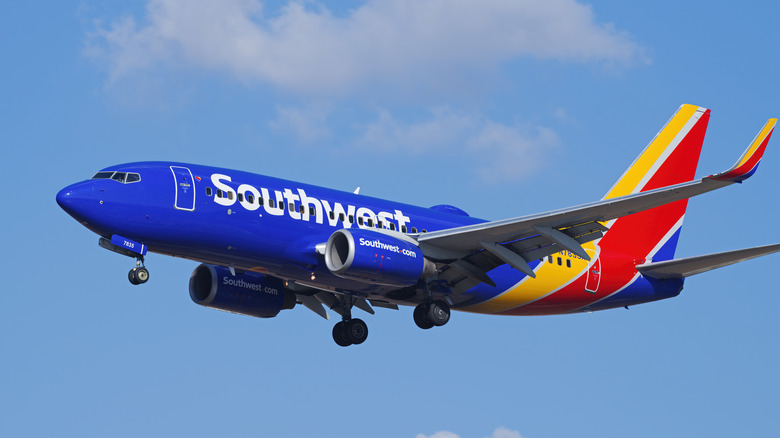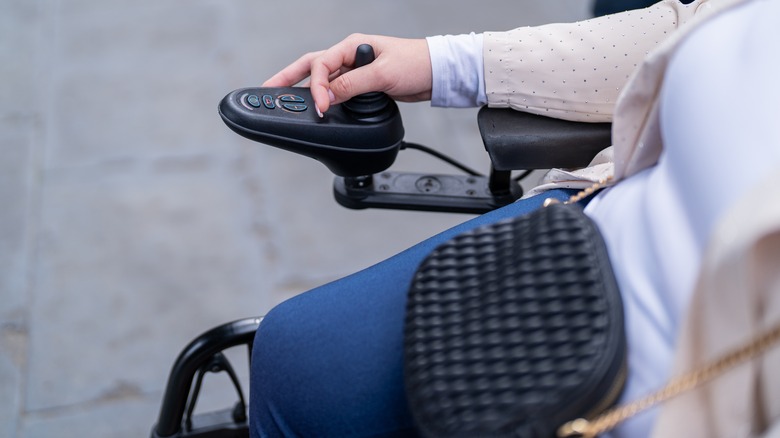Southwest Airlines Is Making Passengers Remove A Potentially Essential Common Item Before Boarding
If you've ever checked a bag at the airport, you've likely been asked whether it contained any lithium-ion batteries — like those found in laptops, cellphones, lighters, battery-powered drones, and other rechargeable electronics. That's because lithium batteries are prohibited in checked baggage and must be carried in the cabin due to fire risk. Now, to avoid mistakes that slow you down while traveling through airports, you'll want to pay attention to a new rule on Southwest Airlines. The change follows new warnings from the Federal Aviation Administration (FAA) regarding lithium batteries. Starting September 25, 2025, Southwest will require passengers to remove lithium batteries from powered wheelchairs and scooters before boarding.
The rule is in line with an FAA safety alert issued August 25, 2025. Until now, the restriction had not applied to mobility devices, but the FAA's updated guidance highlights increased concerns about battery safety and ignition sources, prompting Southwest to take the lead among U.S. carriers in tightening regulations. "These updates are designed to enhance safety and align with international standards, further protecting our customers and our crew members," said Dave Hunt, Southwest's vice president of safety and security, in an internal memo obtained by People. In August 2025 alone, the FAA tracked 50 in-cabin fires linked to lithium batteries.
This isn't the airline's first move to reduce in-flight battery hazards. In May 2025, Southwest began requiring passengers to keep portable chargers and power banks within sight, prohibiting them from charging in overhead bins during flights. The airline explained that the change would make it easier for crews to respond to emergencies. While similar policies have already been adopted by several Asian airlines and all carriers based in South Korea, Southwest is now the first major U.S. airline to enforce such visible lithium battery protocols.
Thermal runaway can cause lithium ion batteries to explode mid-flight
Lithium-ion batteries can become an ignition source if they are damaged, poorly manufactured, incorrectly charged, or sustaining any other defect. These batteries risk entering a process known as "thermal runaway," a chain reaction in which they overheat and possibly explode, ignite, or emit toxic gases. Lithium-ion fires are uniquely dangerous: They burn hot and fast, can spread within seconds, and are often more difficult to extinguish than other types of fires. Incidents have been rising with enough severity that airlines and regulators are under pressure to reduce risks.
Southwest has implemented other big changes in its policies this year, causing some customer backlash. Not all of the changes were safety-related, with some seen as focused on the company's bottom line. Lithium-powered devices have become such an essential part of daily life that it's difficult to leave them behind, but cumbersome to carry on board. Luckily, Southwest has promised that its new rule for mobility devices will not count against carry-on luggage limits.
Travelers have already complained on Reddit that inconsistencies between the Transportation Security Administration's (TSA) mandates and specific airline rules make it difficult to plan accordingly. Even approved carry-on electronics like laptops sometimes get flagged for explosives testing by TSA during the security process. "The rule that was announced they make everyone aware of now is no active charging of devices using external battery packs unless it's in plain sight — not in backpacks or overhead," Reddit user Seg9585 posted after what they thought were approved carry-on batteries were nonetheless confiscated by TSA. "Different situation from well-packaged or new-in-box batteries," they added. Safety is paramount when flying, but careful packing and researching the latest guidelines will be crucial for travelers as the FAA and TSA continue tightening restrictions on approved battery size and packaging.

